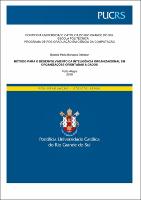| Share record |


|
Please use this identifier to cite or link to this item:
https://tede2.pucrs.br/tede2/handle/tede/8818Full metadata record
| DC Field | Value | Language |
|---|---|---|
| dc.creator | Dehtear, Beatriz Perla Benezra | - |
| dc.creator.Lattes | http://lattes.cnpq.br/8544614355923058 | por |
| dc.contributor.advisor1 | Ruiz, Duncan Dubugras Alcoba | - |
| dc.contributor.advisor1Lattes | http://lattes.cnpq.br/8250832800932125 | por |
| dc.date.accessioned | 2019-07-26T12:16:41Z | - |
| dc.date.issued | 2019-03-26 | - |
| dc.identifier.uri | http://tede2.pucrs.br/tede2/handle/tede/8818 | - |
| dc.description.resumo | Embora a Cultura Orientada a Dados seja amplamente adotada pelas organizações como uma forma de apoio à tomada de decisão, existe um potencial maior nos dados que pode ser explorado na geração de insights e novos conhecimentos. Este novo conhecimento, quando aplicado em prol dos objetivos organizacionais, imprime um comportamento organizacional diferenciado que caracteriza as chamadas “Organizações com Comportamento Inteligente”. Existe uma relação direta entre a complexidade dos diferentes elementos envolvidos para a extração de conhecimento a partir de dados e o valor que o conhecimento gerado tem para a organização. Assim sendo, existe um processo evolutivo de complexidade crescente na passagem da situação inicial, onde os dados são usados no apoio ao processo de tomada de decisão, para uma nova situação, onde estes dados são usados para descoberta de conhecimento. Este trabalho apresenta um Método que tem como objetivo ajudar organizações a fazer a transição entre as duas situações descritas. O Método considera como ponto de partida uma plataforma DW/BI (Data Warehouse/Business Intelligence). Um conjunto de ações realizadas em forma organizada executam a transição para o estado final, resultando na implementação do processo de KDD (Knowledge Discovery in Databases). Na transição, a operação da plataforma DW/BI não é afetada. O Método é avaliado pela sua aplicabilidade e facilidade de uso de acordo com o questionário que faz parte do modelo TAM (Technology Acceptance Model) e que tem este objetivo. Um Tutorial é usado como artefato para a avaliação, esta realizada por um Grupo Focal de especialistas. | por |
| dc.description.abstract | Although Data-driven culture is widely adopted by organizations as a support in the decision-making process, there is a greater potential in data that can be explored by the generation of insights and new knowledge. This new knowledge, when applied in favor of organizational objectives, creates a differentiated organizational behavior that characterizes the so called "Intelligent Behavior Organizations". There is a direct relationship between the complexity of the different elements involved in the extraction of knowledge from data and the value that the knowledge generates for the organization. Thus, there is an evolutionary process of increasing complexity in the transition of the situation, in which data is used to support the decision-making process, into a new situation in which data is a knowledge discovery resource. This work presents a Method that aims helping organizations with the transition between the two described situations. The Method considers as the starting point a DW/BI (Data Warehouse/Business Intelligence) platform. A set of actions performed in an organized way executes the transition to the final state resulting in the implementation of the Knowledge Discovery in Databases (KDD) process. During the transition, the operation of the DW/BI platform is unaffected. The Method is evaluated considering its applicability and its ease of use according to TA´s (Technology Acceptance Model) questionnaire, that is part of this model. A Tutorial is used as an artifact for evaluation by a specialists’ Focal Group. | eng |
| dc.description.provenance | Submitted by PPG Ciência da Computação ([email protected]) on 2019-07-22T12:38:58Z No. of bitstreams: 1 BEATRIZ PERLA BENEZRA DEHTEAR_DIS.pdf: 8092972 bytes, checksum: 9b4352a8925389c8833a9108c9bca73c (MD5) | eng |
| dc.description.provenance | Approved for entry into archive by Sarajane Pan ([email protected]) on 2019-07-26T12:10:19Z (GMT) No. of bitstreams: 1 BEATRIZ PERLA BENEZRA DEHTEAR_DIS.pdf: 8092972 bytes, checksum: 9b4352a8925389c8833a9108c9bca73c (MD5) | eng |
| dc.description.provenance | Made available in DSpace on 2019-07-26T12:16:41Z (GMT). No. of bitstreams: 1 BEATRIZ PERLA BENEZRA DEHTEAR_DIS.pdf: 8092972 bytes, checksum: 9b4352a8925389c8833a9108c9bca73c (MD5) Previous issue date: 2019-03-26 | eng |
| dc.format | application/pdf | * |
| dc.thumbnail.url | http://tede2.pucrs.br:80/tede2/retrieve/176033/BEATRIZ%20PERLA%20BENEZRA%20DEHTEAR_DIS.pdf.jpg | * |
| dc.language | por | por |
| dc.publisher | Pontifícia Universidade Católica do Rio Grande do Sul | por |
| dc.publisher.department | Escola Politécnica | por |
| dc.publisher.country | Brasil | por |
| dc.publisher.initials | PUCRS | por |
| dc.publisher.program | Programa de Pós-Graduação em Ciência da Computação | por |
| dc.rights | Acesso Aberto | por |
| dc.subject | Organizações Orientadas a Dados | por |
| dc.subject | Descoberta de Conhecimento em Banco de Dados | por |
| dc.subject | Organizações Inteligentes | por |
| dc.subject | Cultura Orientada a Dados | por |
| dc.subject | Data Oriented Organizations | eng |
| dc.subject | Knowledge Discovery in Databases | eng |
| dc.subject | Smart Organizations | eng |
| dc.subject | Data-Driven Culture | eng |
| dc.subject.cnpq | CIENCIA DA COMPUTACAO::TEORIA DA COMPUTACAO | por |
| dc.title | Método para o desenvolvimento da inteligência organizacional em organizações orientadas a dados | por |
| dc.type | Dissertação | por |
| dc.restricao.situacao | Trabalho não apresenta restrição para publicação | por |
| Appears in Collections: | Programa de Pós-Graduação em Ciência da Computação | |
Files in This Item:
| File | Description | Size | Format | |
|---|---|---|---|---|
| BEATRIZ PERLA BENEZRA DEHTEAR_DIS.pdf | BEATRIZ_PERLA_BENEZRA_DEHTEAR_DIS | 7.9 MB | Adobe PDF |  Download/Open Preview |
Items in DSpace are protected by copyright, with all rights reserved, unless otherwise indicated.




